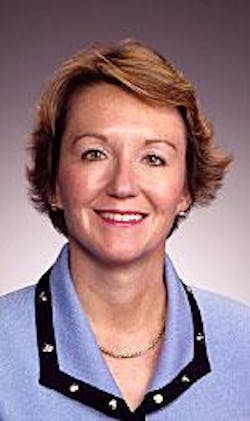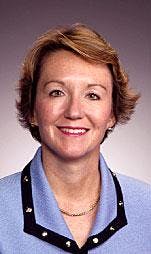Special Report: POINT OF VIEWBG riding wave of LNG capacity expansion boom
Projected strong growth in global natural gas demand, coupled with advances in LNG economics, is spawning a wave of LNG projects around the world. A number of top energy companies have carved out new business units to exploit such new LNG opportunities.
One such company-BG Group unit BG LNG Services LLC of Houston-has recently named Elizabeth Spomer vice-president, global LNG, and CEO of the LNG unit. In her new position, Spomer will orchestrate the company's planned LNG expansion projects in Trinidad and Tobago and Egypt as well as spearhead other LNG developments elsewhere around the world.
Spomer told OGJ, during her seventh week on the job late last month, that her new responsibilities will likely carry a lot of variety over a very short period of time, due to the "huge activity set" of BG's LNG unit. In addition to the aforementioned projects, the firm also has contracted all of the uncommitted capacity at the Lake Charles, La., LNG import terminal for 22 years starting this past January.
BG owns two LNG carriers that are committed to a third party on a long-term basis. BG also charters four carriers that are contracted to both long and short-term trades.
In the second quarter of 2004, BG will receive a new 138,000 cu m LNG carrier and has secured options for six additional new carriers, half of which could be delivered in 2005 and the other half in 2006.
"One of the things that I'm enjoying the mostellipseis getting involved with some of the issues downstream of Lake Charles," Spomer said.
One of the unique challenges to marketing and shipping LNG vs. pipe- line gas, she noted, comes from the fact that LNG is a batch product, therefore making a smooth delivery schedule a bit of a challenge.
Most recently, Spomer has been busy getting people in place and leveling out the unit's loading and dispatch schedules as well as looking for options downstream of the terminal to access other markets.
"Lake Charles was taken by BG Group as a long-term play," she explained. Once the company began getting long-term supply arrangements in place, Spomer said that planning, as well as profitability, became easier to predict.
Project familiarity
In 1994, Spomer said she was the fourth full-time person from BP PLC predecessor Amoco Corp. to join the Trinidad LNG project, where she served as the commercial director for Amoco on Train 1 and then as project manager for Trains 2 and 3. (The merger of BP and Amoco cut across this second phase of the project.)
"There's no way I could say anything other than my experiences in Trinidad would be the highlight of my career," Spomer said. "It was very exciting what we achieved in Trinidad, and I think we changed the game substantially," she said, adding, "I think we almost benefited by not having any sacrosanct mental models in mind -we almost didn't know what we didn't know and came up with something that's very commercially driven and very nimble."
The Trinidad model, Spomer observed-as far as partners taking gas in-kind and marketing it on their own-is now being mirrored in many other new LNG projects throughout the world.
Since BG is one of BP's partners in Trinidad, Spomer said she got to know a large number of key BG players very well. Her latest career move, therefore, was "a little bit like walking across the street," she said. "I know-to some degree-most of the key players inside the company, so it's been great for me to come back."
Another career highlight, Spomer explained, was working with BP on the Guangdong LNG terminal and trunk pipeline project in China. Spomer was involved in the very first phases of the process, from putting the bid together to actually winning the terminal project, something she wasn't so sure would happen, looking back now.
Changing industry
Over the years of overseeing various LNG projects, Spomer said that her perspective on the industry hasn't changed much, if at all.
"I'm not sure the (LNG) industry is changing as fast as some people think that it is, but the way it's changing is very consistent with what we expected it to be when we started in Trinidad," she said.
What the LNG market does require, however, is liquidity, which is what the opening of the terminals in the US will provide, she said.
"There's a lot of talk about a West Coast terminal, and I think there will probably be one, maybe two or three," Spomer predicted, although winning out over the public's concern over permitting such sites will be a big challenge. She said that this is due to LNG receiving a billing as being a "unique and specialized" commodity relative to any of the other petrochemical traffic entering and leaving US ports. From a risk perspective, however, Spomer stated, "I would much rather live near an LNG terminal than an LPG terminal, let me put it that way."
Through education, Spomer hopes that the public's perception about LNG will change. "LNG is not under pressure; it doesn't explode; if it were to ignite, it would burn in place-it's actually a very safe way of storing natural gas and bringing it to market when the market requires it," she explained.
"I think there may be an education process, but I think the statistics of the industry are so good that we'll be successful, and it's on that basis that I think we will see some new terminals built in the US," she said.
Natural gas markets
Natural gas markets will continue to have an impact on the progress of LNG development projects, Spomer noted. "What's interesting is that gas prices have been stronger in the US for the last 3 years in the summer. We're starting to see a strengthening in summer prices at the expense of winter prices, which may be a genuine counterseasonal move due to the population in the south, the air-conditioning load, and the power load in the south vs. the heating load in the north," she said.
This shift, she said, will provide some interesting options for LNG shippers due to Europe's extremely seasonable gas load. Marketers, therefore, "can start to do some things between Europe and the US that might make a lot of sense for both markets," she said.
BG will manage price risk through multiple market opportunities and by staying flexible on the day as to where it sends its gas, Spomer said.
"I think that there are projects-such as Trinidad-that have such a phenomenal cost structure that they can work at really any kind of anticipated US gas price, including something as low as Henry Hub at $2(/Mcf)," she said.
Atlantic Basin focus
BG, without question, will maintain its focus on the Atlantic Basin, Spomer said, rather than in the Asia-Pacific region. The challenge with maintaining a presence in the Asia-Pacific region comes down to liquidity and managing volumes effectively, she said. Due to the large seasonality swings in both Japan-the largest LNG importer at present-and South Korea, managing volumes is very difficult.
To account for this vast swing in volume, Spomer explained, there has been a lot of capital expended into the building of storage and of LNG tankers that are not used during the summer months. "That market does not have the kind of liquidity that it needs to really drive down some of these cost structures, and I think the buyers are looking more and more to suppliers to provide some of that volume management," she said.
It is because of this lack of a way to manage volume differentials and seasonality that the development of the Asia-Pacific LNG market differs from what is being seen in the Atlantic Basin, Spomer stated.
"I think in Asia, traditionally, there's been a huge premium paid for security of supply, whereas in a market like in the US, where anybody can buy gas at a price, you don't have to put in that kind of redundancy and capitalization."
Career highlights
Elizabeth Spomer has recently joined BG Group as vice-president, Global LNG, and CEO of BG LNG Services LLC. The new position, says BG, reflects the company's "growing strategic importance" of its LNG interests worldwide. Spomer will be based in Houston, the headquarters city of BG LNG Services. Presently, BG is applying experience gained from its Atlantic LNG export project in Trinidad and Tobago to additional trains in Trinidad as well as a planned LNG project in Egypt. In the US, BG LNG Services has contracted all of the uncommitted capacity at the Lake Charles, La., LNG terminal for 22 years starting at the beginning of this year. BG also is pursuing grassroots LNG projects in India and Italy.
Employment
Spomer joined BG with 14 years of international project management and negotiations experience gained while working for BP Amoco Corp. before its acquisition by BP PLC. Most recently, she served as BP's LNG regional manager, Asia-Pacific, where she oversaw BP's LNG businesses in the Pacific Basin with a specific emphasis on the company's Guangdong LNG terminal project in China. Before working in Asia, Spomer served as LNG regional manager, Americas, directing BP's LNG operations in the Atlantic Basin and North America, including BP's proposed LNG regasification terminals in the US, the Caribbean, and Mexico. Spomer also served as project general manager of BP's $1.2 billion Trinidad LNG expansion, managing the implementation of a two-train expansion of the country's LNG export project (see related article, p. 20). Early project management work at BP involved extensive work in Trinidad and South America. Prior to joining BP, Spomer gained experience in North American operations while working for Tenneco Oil Co. and Gulf Oil Co.
Education
Spomer holds a masters of business administration and a bachelor of arts degree in economics and history from the University of Colorado.

